Recharacterizing Restructuring: Law, Distribution and Gender in Market Reform
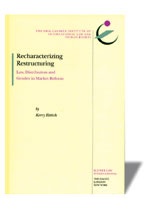 In the last decade, market-centered economic reforms have been implemented in a range of developing and transitional countries under the auspices of the international financial institutions. Whether they deliver the promised prosperity, they appear to be associated with widening economic inequality as well as disadvantage for particular social groups, among them women and workers. This book argues that such effects are neither temporary nor accidental. Instead, efforts to promote growth through greater efficiency inevitably engage distributive concerns. Change in the status of different groups is connected to the process of legal and institutional reform.
In the last decade, market-centered economic reforms have been implemented in a range of developing and transitional countries under the auspices of the international financial institutions. Whether they deliver the promised prosperity, they appear to be associated with widening economic inequality as well as disadvantage for particular social groups, among them women and workers. This book argues that such effects are neither temporary nor accidental. Instead, efforts to promote growth through greater efficiency inevitably engage distributive concerns. Change in the status of different groups is connected to the process of legal and institutional reform.
Back to Top
Canadian Health Law and Policy (2nd Edition)
Edited by Jocelyn Downie, Timothy Caulfield & Colleen Flood
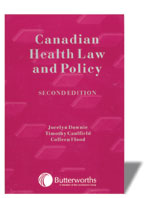 This book provides concise surveys of the current state of law and practice in each of the significant subject areas of health law. The 2nd Edition incorporates the latest developments in legislation, case law, scientific advances, as well as the latest trends in the funding and administration of Medicare. New material and issues addressed include: the civil liability of physicians under Quebec law; privacy legislation and its effect on hospitals and health care providers; political and economic forces such as funding level changes, hospital closures, and emigration of physicians and nurses; private financing approaches; federal government proposals to limit or prohibit assisted human reproduction technologies, such as cloning; Supreme Court of Canada's decisions in Latimer (euthanasia) and Dobson (liability of mother in tort to unborn fetus); and, the legal implications of such advances in medical science as the mapping of the human genome, embryo and stem cell research, and cloning.
This book provides concise surveys of the current state of law and practice in each of the significant subject areas of health law. The 2nd Edition incorporates the latest developments in legislation, case law, scientific advances, as well as the latest trends in the funding and administration of Medicare. New material and issues addressed include: the civil liability of physicians under Quebec law; privacy legislation and its effect on hospitals and health care providers; political and economic forces such as funding level changes, hospital closures, and emigration of physicians and nurses; private financing approaches; federal government proposals to limit or prohibit assisted human reproduction technologies, such as cloning; Supreme Court of Canada's decisions in Latimer (euthanasia) and Dobson (liability of mother in tort to unborn fetus); and, the legal implications of such advances in medical science as the mapping of the human genome, embryo and stem cell research, and cloning.
Back to T
Privatization, Law, and the Challenge to Feminism
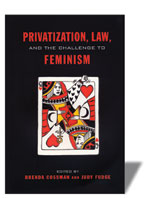 Privatization has caused a large reconfiguration of the relations between state, market and family in the late 20th and the early 21st centuries, all of which has had a profound effect on the lives of women. This collection of essays addresses this timely issue by examining eight case studies on the role of law in various arenas such as fiscal and labour market policy, family and immigration law, and laws designed to regulate health services and to prohibit child prostitution. Starting from the shared assumption that privatization signals a transition from welfare state to neo-liberal state, the authors illustrate the role of law in this process, and its impact on women and on the gender order. In doing so, the contributors lay bare the complex interplay between a globalized political economy, social reproduction and legal regulation, providing an important contribution to feminist political theory and legal theory. Of relevance to political science and law practitioners, scholars and students - especially those interested in the areas of public policy and the state - these essays contribute to debates about gender and will attract a wide feminist audience.
Privatization has caused a large reconfiguration of the relations between state, market and family in the late 20th and the early 21st centuries, all of which has had a profound effect on the lives of women. This collection of essays addresses this timely issue by examining eight case studies on the role of law in various arenas such as fiscal and labour market policy, family and immigration law, and laws designed to regulate health services and to prohibit child prostitution. Starting from the shared assumption that privatization signals a transition from welfare state to neo-liberal state, the authors illustrate the role of law in this process, and its impact on women and on the gender order. In doing so, the contributors lay bare the complex interplay between a globalized political economy, social reproduction and legal regulation, providing an important contribution to feminist political theory and legal theory. Of relevance to political science and law practitioners, scholars and students - especially those interested in the areas of public policy and the state - these essays contribute to debates about gender and will attract a wide feminist audience.
Back to Top
Diversity and Self-determination in International Law
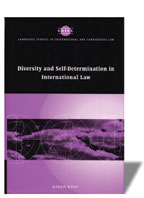 The emergence of new states and independence movements after the Cold War has intensified the long-standing disagreement among international lawyers over the right of self-determination, especially the right of secession. Knop shifts the discussion from the articulation of the right to its interpretation. She argues that the practice of interpretation involves and illuminates a problem of diversity raised by the exclusion of many of the groups that self-determination most affects. Distinguishing different types of exclusion and the relationships between them reveals the deep structures, biases and stakes in the decisions and scholarship on self-determination. Knop's analysis also reveals that the leading cases have grappled with these embedded inequalities. Challenges by colonies, ethnic nations, indigenous peoples, women and others to the gender and cultural biases of international law emerge as integral to the interpretation of self-determination historically, as do attempts by judges and other institutional interpreters to meet these challenges.
The emergence of new states and independence movements after the Cold War has intensified the long-standing disagreement among international lawyers over the right of self-determination, especially the right of secession. Knop shifts the discussion from the articulation of the right to its interpretation. She argues that the practice of interpretation involves and illuminates a problem of diversity raised by the exclusion of many of the groups that self-determination most affects. Distinguishing different types of exclusion and the relationships between them reveals the deep structures, biases and stakes in the decisions and scholarship on self-determination. Knop's analysis also reveals that the leading cases have grappled with these embedded inequalities. Challenges by colonies, ethnic nations, indigenous peoples, women and others to the gender and cultural biases of international law emerge as integral to the interpretation of self-determination historically, as do attempts by judges and other institutional interpreters to meet these challenges.
Back to Top
Securities Law
 Canadian securities law comprises a unique mix of enduring basic principles and constantly-changing technical details. This new book, by Jeffrey MacIntosh and Christopher Nicholls, provides a solid introduction to both. The book includes a survey of all of the "usual" securities law topics - including basic definitions, the public and exempt markets for securities, insider trading, continuous disclosure and takeover and issuer bids. But the discussion of these and other specific topics is interwoven with a careful consideration of larger public policy issues. The authors thus help guide the reader through the complex labyrinth of modern securities regulation by constantly highlighting the unifying thread of fundamental principles.
Canadian securities law comprises a unique mix of enduring basic principles and constantly-changing technical details. This new book, by Jeffrey MacIntosh and Christopher Nicholls, provides a solid introduction to both. The book includes a survey of all of the "usual" securities law topics - including basic definitions, the public and exempt markets for securities, insider trading, continuous disclosure and takeover and issuer bids. But the discussion of these and other specific topics is interwoven with a careful consideration of larger public policy issues. The authors thus help guide the reader through the complex labyrinth of modern securities regulation by constantly highlighting the unifying thread of fundamental principles.
Back to Top
The Law and Economics of Canadian Competition Policy
 Offering a cross-disciplinary approach to scholarship in law and economics, this work evaluates the major doctrines of Canadian competition policy. Topics include: Canadian competition policy in an historical context; basic economic concepts; multi-firm conduct; horizontal agreements; the merger review process; predatory pricing and price discrimination; vertical restraints; intra-brand competition; inter-brand competition; abuse of dominance; competition policy and intellectual property rights; competition policy and trade policy; competition policy and regulated industries; and enforcement. The treatment of each topic is organized first around a discussion of the relevant body (or bodies) of economic theory and then the pertinent bodies of legal doctrine, including case law. Each chapter contains a critique of existing law in light of contemporary economic theory. This also offers an up-to-date integrated analysis of economic theory and legal doctrine in the context of Canadian competition policy.
Offering a cross-disciplinary approach to scholarship in law and economics, this work evaluates the major doctrines of Canadian competition policy. Topics include: Canadian competition policy in an historical context; basic economic concepts; multi-firm conduct; horizontal agreements; the merger review process; predatory pricing and price discrimination; vertical restraints; intra-brand competition; inter-brand competition; abuse of dominance; competition policy and intellectual property rights; competition policy and trade policy; competition policy and regulated industries; and enforcement. The treatment of each topic is organized first around a discussion of the relevant body (or bodies) of economic theory and then the pertinent bodies of legal doctrine, including case law. Each chapter contains a critique of existing law in light of contemporary economic theory. This also offers an up-to-date integrated analysis of economic theory and legal doctrine in the context of Canadian competition policy.
Back to Top
Public Law
Lorne Sossin and Michael Bryant
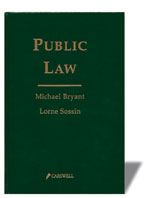 Public Law provides comprehensive coverage, in one volume, of topics that affect the practice of every lawyer and anyone studying the law: Charter litigation, federalism, Aboriginal law, public international law and administrative law. For practitioners with cursory knowledge of public law, experts wishing a refresher, and students requiring an overview, Public Law permits quick reference, without having to access the many treatises for each of the public law subjects covered. Public Law also serves as an excellent introduction to the core doctrines of public law for students and non-lawyers.
Public Law provides comprehensive coverage, in one volume, of topics that affect the practice of every lawyer and anyone studying the law: Charter litigation, federalism, Aboriginal law, public international law and administrative law. For practitioners with cursory knowledge of public law, experts wishing a refresher, and students requiring an overview, Public Law permits quick reference, without having to access the many treatises for each of the public law subjects covered. Public Law also serves as an excellent introduction to the core doctrines of public law for students and non-lawyers.
Back to Top
Canadian Income Tax Law: Cases, Text and Materials
David G. Duff
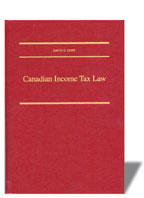 Although developed primarily for use in a basic course on Canadian income tax law, the book is of value not only to students and tax teachers, but also to tax lawyers and accountants, tax administrators, judges, policy makers, and anyone else interested in learning about Canadian income tax law. In writing the book, Prof. Duff's aim has been to make the study of Canadian income tax law both interesting and accessible, without avoiding any of the technical detail that is necessarily involved in this field of law. By combining the features of a textbook and a casebook and devoting attention both to the text of the Income Tax Act and to cases in which this text has been interpreted and applied, the book is intended to provide a basis for a critical understanding of the law and policy of Canadian income taxation.
Although developed primarily for use in a basic course on Canadian income tax law, the book is of value not only to students and tax teachers, but also to tax lawyers and accountants, tax administrators, judges, policy makers, and anyone else interested in learning about Canadian income tax law. In writing the book, Prof. Duff's aim has been to make the study of Canadian income tax law both interesting and accessible, without avoiding any of the technical detail that is necessarily involved in this field of law. By combining the features of a textbook and a casebook and devoting attention both to the text of the Income Tax Act and to cases in which this text has been interpreted and applied, the book is intended to provide a basis for a critical understanding of the law and policy of Canadian income taxation.
Back to Top
Evidence: A Canadian Casebook
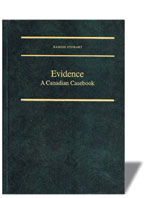 In most law school courses, the "facts" of the cases studied are taken as given: they are presented as found by a trial court or tribunal or as understood by an appellate court. But in most contested cases, the parties will offer the tribunal different versions of the facts. The law of evidence establishes rules and principles governing the means that the parties can use to try to establish their versions of the facts, and the reasoning that the trier of fact is permitted to engage in while determining the facts. Topics covered include: sources and goals of evidence law; basic concepts of evidence law (e.g., relevancy, probative value, prejudicial effect); traditional exclusionary rules (e.g., the rule against hearsay and its exceptions, the rules governing character evidence, the common law confessions rule); exclusion of evidence under the Canadian Charter of Rights and Freedoms; the protection of confidential information via privilege and other doctrines; and several other aspects of proof and procedure.
In most law school courses, the "facts" of the cases studied are taken as given: they are presented as found by a trial court or tribunal or as understood by an appellate court. But in most contested cases, the parties will offer the tribunal different versions of the facts. The law of evidence establishes rules and principles governing the means that the parties can use to try to establish their versions of the facts, and the reasoning that the trier of fact is permitted to engage in while determining the facts. Topics covered include: sources and goals of evidence law; basic concepts of evidence law (e.g., relevancy, probative value, prejudicial effect); traditional exclusionary rules (e.g., the rule against hearsay and its exceptions, the rules governing character evidence, the common law confessions rule); exclusion of evidence under the Canadian Charter of Rights and Freedoms; the protection of confidential information via privilege and other doctrines; and several other aspects of proof and procedure.
Back to Top

 In the last decade, market-centered economic reforms have been implemented in a range of developing and transitional countries under the auspices of the international financial institutions. Whether they deliver the promised prosperity, they appear to be associated with widening economic inequality as well as disadvantage for particular social groups, among them women and workers. This book argues that such effects are neither temporary nor accidental. Instead, efforts to promote growth through greater efficiency inevitably engage distributive concerns. Change in the status of different groups is connected to the process of legal and institutional reform.
In the last decade, market-centered economic reforms have been implemented in a range of developing and transitional countries under the auspices of the international financial institutions. Whether they deliver the promised prosperity, they appear to be associated with widening economic inequality as well as disadvantage for particular social groups, among them women and workers. This book argues that such effects are neither temporary nor accidental. Instead, efforts to promote growth through greater efficiency inevitably engage distributive concerns. Change in the status of different groups is connected to the process of legal and institutional reform. This book provides concise surveys of the current state of law and practice in each of the significant subject areas of health law. The 2nd Edition incorporates the latest developments in legislation, case law, scientific advances, as well as the latest trends in the funding and administration of Medicare. New material and issues addressed include: the civil liability of physicians under Quebec law; privacy legislation and its effect on hospitals and health care providers; political and economic forces such as funding level changes, hospital closures, and emigration of physicians and nurses; private financing approaches; federal government proposals to limit or prohibit assisted human reproduction technologies, such as cloning; Supreme Court of Canada's decisions in Latimer (euthanasia) and Dobson (liability of mother in tort to unborn fetus); and, the legal implications of such advances in medical science as the mapping of the human genome, embryo and stem cell research, and cloning.
This book provides concise surveys of the current state of law and practice in each of the significant subject areas of health law. The 2nd Edition incorporates the latest developments in legislation, case law, scientific advances, as well as the latest trends in the funding and administration of Medicare. New material and issues addressed include: the civil liability of physicians under Quebec law; privacy legislation and its effect on hospitals and health care providers; political and economic forces such as funding level changes, hospital closures, and emigration of physicians and nurses; private financing approaches; federal government proposals to limit or prohibit assisted human reproduction technologies, such as cloning; Supreme Court of Canada's decisions in Latimer (euthanasia) and Dobson (liability of mother in tort to unborn fetus); and, the legal implications of such advances in medical science as the mapping of the human genome, embryo and stem cell research, and cloning.  Privatization has caused a large reconfiguration of the relations between state, market and family in the late 20th and the early 21st centuries, all of which has had a profound effect on the lives of women. This collection of essays addresses this timely issue by examining eight case studies on the role of law in various arenas such as fiscal and labour market policy, family and immigration law, and laws designed to regulate health services and to prohibit child prostitution. Starting from the shared assumption that privatization signals a transition from welfare state to neo-liberal state, the authors illustrate the role of law in this process, and its impact on women and on the gender order. In doing so, the contributors lay bare the complex interplay between a globalized political economy, social reproduction and legal regulation, providing an important contribution to feminist political theory and legal theory. Of relevance to political science and law practitioners, scholars and students - especially those interested in the areas of public policy and the state - these essays contribute to debates about gender and will attract a wide feminist audience.
Privatization has caused a large reconfiguration of the relations between state, market and family in the late 20th and the early 21st centuries, all of which has had a profound effect on the lives of women. This collection of essays addresses this timely issue by examining eight case studies on the role of law in various arenas such as fiscal and labour market policy, family and immigration law, and laws designed to regulate health services and to prohibit child prostitution. Starting from the shared assumption that privatization signals a transition from welfare state to neo-liberal state, the authors illustrate the role of law in this process, and its impact on women and on the gender order. In doing so, the contributors lay bare the complex interplay between a globalized political economy, social reproduction and legal regulation, providing an important contribution to feminist political theory and legal theory. Of relevance to political science and law practitioners, scholars and students - especially those interested in the areas of public policy and the state - these essays contribute to debates about gender and will attract a wide feminist audience.  The emergence of new states and independence movements after the Cold War has intensified the long-standing disagreement among international lawyers over the right of self-determination, especially the right of secession. Knop shifts the discussion from the articulation of the right to its interpretation. She argues that the practice of interpretation involves and illuminates a problem of diversity raised by the exclusion of many of the groups that self-determination most affects. Distinguishing different types of exclusion and the relationships between them reveals the deep structures, biases and stakes in the decisions and scholarship on self-determination. Knop's analysis also reveals that the leading cases have grappled with these embedded inequalities. Challenges by colonies, ethnic nations, indigenous peoples, women and others to the gender and cultural biases of international law emerge as integral to the interpretation of self-determination historically, as do attempts by judges and other institutional interpreters to meet these challenges.
The emergence of new states and independence movements after the Cold War has intensified the long-standing disagreement among international lawyers over the right of self-determination, especially the right of secession. Knop shifts the discussion from the articulation of the right to its interpretation. She argues that the practice of interpretation involves and illuminates a problem of diversity raised by the exclusion of many of the groups that self-determination most affects. Distinguishing different types of exclusion and the relationships between them reveals the deep structures, biases and stakes in the decisions and scholarship on self-determination. Knop's analysis also reveals that the leading cases have grappled with these embedded inequalities. Challenges by colonies, ethnic nations, indigenous peoples, women and others to the gender and cultural biases of international law emerge as integral to the interpretation of self-determination historically, as do attempts by judges and other institutional interpreters to meet these challenges.  Canadian securities law comprises a unique mix of enduring basic principles and constantly-changing technical details. This new book, by Jeffrey MacIntosh and Christopher Nicholls, provides a solid introduction to both. The book includes a survey of all of the "usual" securities law topics - including basic definitions, the public and exempt markets for securities, insider trading, continuous disclosure and takeover and issuer bids. But the discussion of these and other specific topics is interwoven with a careful consideration of larger public policy issues. The authors thus help guide the reader through the complex labyrinth of modern securities regulation by constantly highlighting the unifying thread of fundamental principles.
Canadian securities law comprises a unique mix of enduring basic principles and constantly-changing technical details. This new book, by Jeffrey MacIntosh and Christopher Nicholls, provides a solid introduction to both. The book includes a survey of all of the "usual" securities law topics - including basic definitions, the public and exempt markets for securities, insider trading, continuous disclosure and takeover and issuer bids. But the discussion of these and other specific topics is interwoven with a careful consideration of larger public policy issues. The authors thus help guide the reader through the complex labyrinth of modern securities regulation by constantly highlighting the unifying thread of fundamental principles. Offering a cross-disciplinary approach to scholarship in law and economics, this work evaluates the major doctrines of Canadian competition policy. Topics include: Canadian competition policy in an historical context; basic economic concepts; multi-firm conduct; horizontal agreements; the merger review process; predatory pricing and price discrimination; vertical restraints; intra-brand competition; inter-brand competition; abuse of dominance; competition policy and intellectual property rights; competition policy and trade policy; competition policy and regulated industries; and enforcement. The treatment of each topic is organized first around a discussion of the relevant body (or bodies) of economic theory and then the pertinent bodies of legal doctrine, including case law. Each chapter contains a critique of existing law in light of contemporary economic theory. This also offers an up-to-date integrated analysis of economic theory and legal doctrine in the context of Canadian competition policy.
Offering a cross-disciplinary approach to scholarship in law and economics, this work evaluates the major doctrines of Canadian competition policy. Topics include: Canadian competition policy in an historical context; basic economic concepts; multi-firm conduct; horizontal agreements; the merger review process; predatory pricing and price discrimination; vertical restraints; intra-brand competition; inter-brand competition; abuse of dominance; competition policy and intellectual property rights; competition policy and trade policy; competition policy and regulated industries; and enforcement. The treatment of each topic is organized first around a discussion of the relevant body (or bodies) of economic theory and then the pertinent bodies of legal doctrine, including case law. Each chapter contains a critique of existing law in light of contemporary economic theory. This also offers an up-to-date integrated analysis of economic theory and legal doctrine in the context of Canadian competition policy.  Public Law provides comprehensive coverage, in one volume, of topics that affect the practice of every lawyer and anyone studying the law: Charter litigation, federalism, Aboriginal law, public international law and administrative law. For practitioners with cursory knowledge of public law, experts wishing a refresher, and students requiring an overview, Public Law permits quick reference, without having to access the many treatises for each of the public law subjects covered. Public Law also serves as an excellent introduction to the core doctrines of public law for students and non-lawyers.
Public Law provides comprehensive coverage, in one volume, of topics that affect the practice of every lawyer and anyone studying the law: Charter litigation, federalism, Aboriginal law, public international law and administrative law. For practitioners with cursory knowledge of public law, experts wishing a refresher, and students requiring an overview, Public Law permits quick reference, without having to access the many treatises for each of the public law subjects covered. Public Law also serves as an excellent introduction to the core doctrines of public law for students and non-lawyers.  Although developed primarily for use in a basic course on Canadian income tax law, the book is of value not only to students and tax teachers, but also to tax lawyers and accountants, tax administrators, judges, policy makers, and anyone else interested in learning about Canadian income tax law. In writing the book, Prof. Duff's aim has been to make the study of Canadian income tax law both interesting and accessible, without avoiding any of the technical detail that is necessarily involved in this field of law. By combining the features of a textbook and a casebook and devoting attention both to the text of the Income Tax Act and to cases in which this text has been interpreted and applied, the book is intended to provide a basis for a critical understanding of the law and policy of Canadian income taxation.
Although developed primarily for use in a basic course on Canadian income tax law, the book is of value not only to students and tax teachers, but also to tax lawyers and accountants, tax administrators, judges, policy makers, and anyone else interested in learning about Canadian income tax law. In writing the book, Prof. Duff's aim has been to make the study of Canadian income tax law both interesting and accessible, without avoiding any of the technical detail that is necessarily involved in this field of law. By combining the features of a textbook and a casebook and devoting attention both to the text of the Income Tax Act and to cases in which this text has been interpreted and applied, the book is intended to provide a basis for a critical understanding of the law and policy of Canadian income taxation.  In most law school courses, the "facts" of the cases studied are taken as given: they are presented as found by a trial court or tribunal or as understood by an appellate court. But in most contested cases, the parties will offer the tribunal different versions of the facts. The law of evidence establishes rules and principles governing the means that the parties can use to try to establish their versions of the facts, and the reasoning that the trier of fact is permitted to engage in while determining the facts. Topics covered include: sources and goals of evidence law; basic concepts of evidence law (e.g., relevancy, probative value, prejudicial effect); traditional exclusionary rules (e.g., the rule against hearsay and its exceptions, the rules governing character evidence, the common law confessions rule); exclusion of evidence under the Canadian Charter of Rights and Freedoms; the protection of confidential information via privilege and other doctrines; and several other aspects of proof and procedure.
In most law school courses, the "facts" of the cases studied are taken as given: they are presented as found by a trial court or tribunal or as understood by an appellate court. But in most contested cases, the parties will offer the tribunal different versions of the facts. The law of evidence establishes rules and principles governing the means that the parties can use to try to establish their versions of the facts, and the reasoning that the trier of fact is permitted to engage in while determining the facts. Topics covered include: sources and goals of evidence law; basic concepts of evidence law (e.g., relevancy, probative value, prejudicial effect); traditional exclusionary rules (e.g., the rule against hearsay and its exceptions, the rules governing character evidence, the common law confessions rule); exclusion of evidence under the Canadian Charter of Rights and Freedoms; the protection of confidential information via privilege and other doctrines; and several other aspects of proof and procedure.